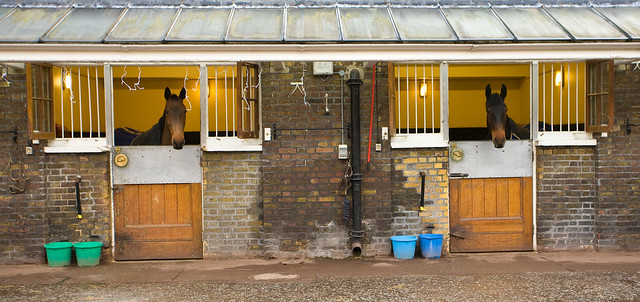Vai offline con l'app Player FM !
Adventures in Etymology – Stable Stables
Manage episode 413530626 series 2425838
In this Adventure in Etymology we find out whether the words stable (a building for horses) and stable (steady, permanent) are related.
A stable is:
- a building for the lodging and feeding of horses, cattle, etc.
- a collection of animals housed in such a building. [other meanings are available]
It comes from Middle Englsh stable (a building for horses), from Anglo-Norman stable (a place for keeping animals), from Latin stablum (dwelling, stable, hut, tavern), from stō (to stand, stay, remain) and -bulum (instrumental suffix) [source].
In Old English, a stable was a horsern [ˈhorˠzˌerˠn] (“horse place”) [source] or a steall [stæ͜ɑll], from which we get the word stall (a compartment for a single animal in a stable or cattle shed) [source].
As an adjective stable means:
- Relatively unchanging, steady, permanent; firmly fixed or established; consistent; not easily moved, altered, or destroyed
It comes from Middle English stable, from Anglo-Norman stable / stabel (stable, firm), from Latin stabilis (firm, steadfast), from stō (to stand, stay, remain) and -abilis (able). It displaced the Old English word for stable, staþolfæst [ˈstɑ.ðolˌfæst] [source].
So it seems that these two words do come from the same roots. Other words from the same roots include stage, stand, state and stamina in English, stabbio (pen, fold, pigsty) in Italian, estar (to be) in Spanish, and ystafell (room, building, house) in Welsh [source].
I forget mention on the podcast, but the reason I chose the word stable for this adventure is because it’s related to the Scottish Gaelic sabhal [sa.əl̪ˠ] (barn), which comes from Middle Irish saball, from Latin stabulum [source], and I’ve just spent a week doing a course in Scottish Gaelic songs at Sabhal Mòr Ostaig (“Ostag’s Big Barn”), the Gaelic college on the Isle of Skye [more details].
You can also listen to this podcast on: Apple Podcasts, Amazon Music, TuneIn, Podchaser, Podbay or Podtail and other pod places.
If you would like to support this podcast, you can make a donation via PayPal or Patreon, or contribute to Omniglot in other ways.
Radio Omniglot podcasts are brought to you in association with Blubrry Podcast Hosting, a great place to host your podcasts. Get your first month free with the promo code omniglot.
I also write about words, etymology and other language-related topics on the Omniglot Blog, and I explore etymological connections between Celtic languages on the Celtiadur blog.
308 episodi
Manage episode 413530626 series 2425838
In this Adventure in Etymology we find out whether the words stable (a building for horses) and stable (steady, permanent) are related.
A stable is:
- a building for the lodging and feeding of horses, cattle, etc.
- a collection of animals housed in such a building. [other meanings are available]
It comes from Middle Englsh stable (a building for horses), from Anglo-Norman stable (a place for keeping animals), from Latin stablum (dwelling, stable, hut, tavern), from stō (to stand, stay, remain) and -bulum (instrumental suffix) [source].
In Old English, a stable was a horsern [ˈhorˠzˌerˠn] (“horse place”) [source] or a steall [stæ͜ɑll], from which we get the word stall (a compartment for a single animal in a stable or cattle shed) [source].
As an adjective stable means:
- Relatively unchanging, steady, permanent; firmly fixed or established; consistent; not easily moved, altered, or destroyed
It comes from Middle English stable, from Anglo-Norman stable / stabel (stable, firm), from Latin stabilis (firm, steadfast), from stō (to stand, stay, remain) and -abilis (able). It displaced the Old English word for stable, staþolfæst [ˈstɑ.ðolˌfæst] [source].
So it seems that these two words do come from the same roots. Other words from the same roots include stage, stand, state and stamina in English, stabbio (pen, fold, pigsty) in Italian, estar (to be) in Spanish, and ystafell (room, building, house) in Welsh [source].
I forget mention on the podcast, but the reason I chose the word stable for this adventure is because it’s related to the Scottish Gaelic sabhal [sa.əl̪ˠ] (barn), which comes from Middle Irish saball, from Latin stabulum [source], and I’ve just spent a week doing a course in Scottish Gaelic songs at Sabhal Mòr Ostaig (“Ostag’s Big Barn”), the Gaelic college on the Isle of Skye [more details].
You can also listen to this podcast on: Apple Podcasts, Amazon Music, TuneIn, Podchaser, Podbay or Podtail and other pod places.
If you would like to support this podcast, you can make a donation via PayPal or Patreon, or contribute to Omniglot in other ways.
Radio Omniglot podcasts are brought to you in association with Blubrry Podcast Hosting, a great place to host your podcasts. Get your first month free with the promo code omniglot.
I also write about words, etymology and other language-related topics on the Omniglot Blog, and I explore etymological connections between Celtic languages on the Celtiadur blog.
308 episodi
Tutti gli episodi
×Benvenuto su Player FM!
Player FM ricerca sul web podcast di alta qualità che tu possa goderti adesso. È la migliore app di podcast e funziona su Android, iPhone e web. Registrati per sincronizzare le iscrizioni su tutti i tuoi dispositivi.







